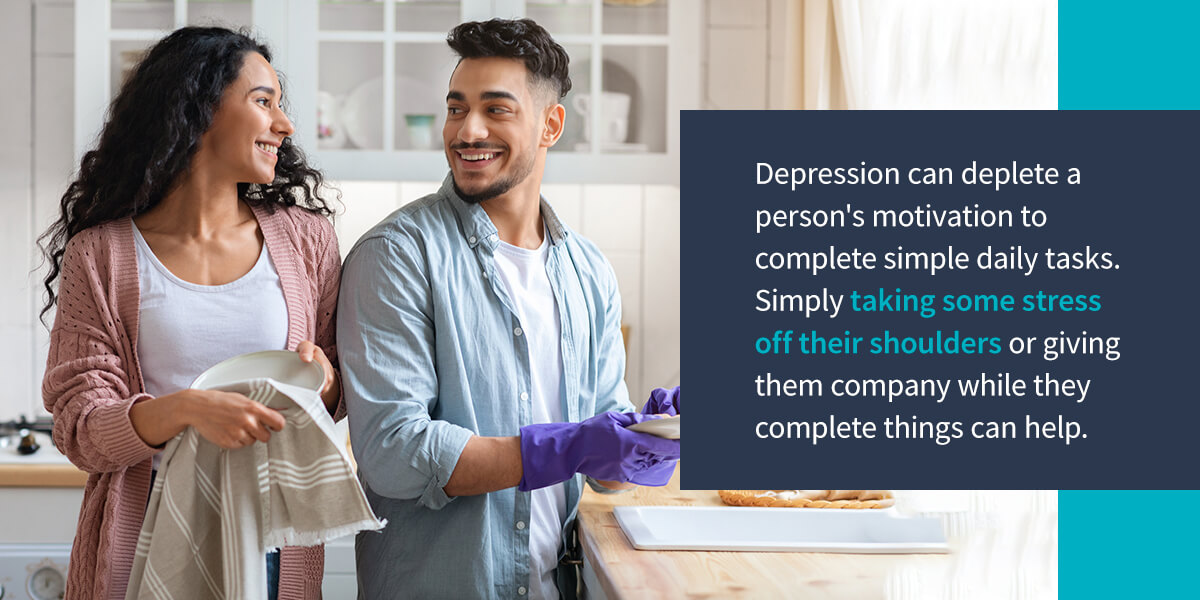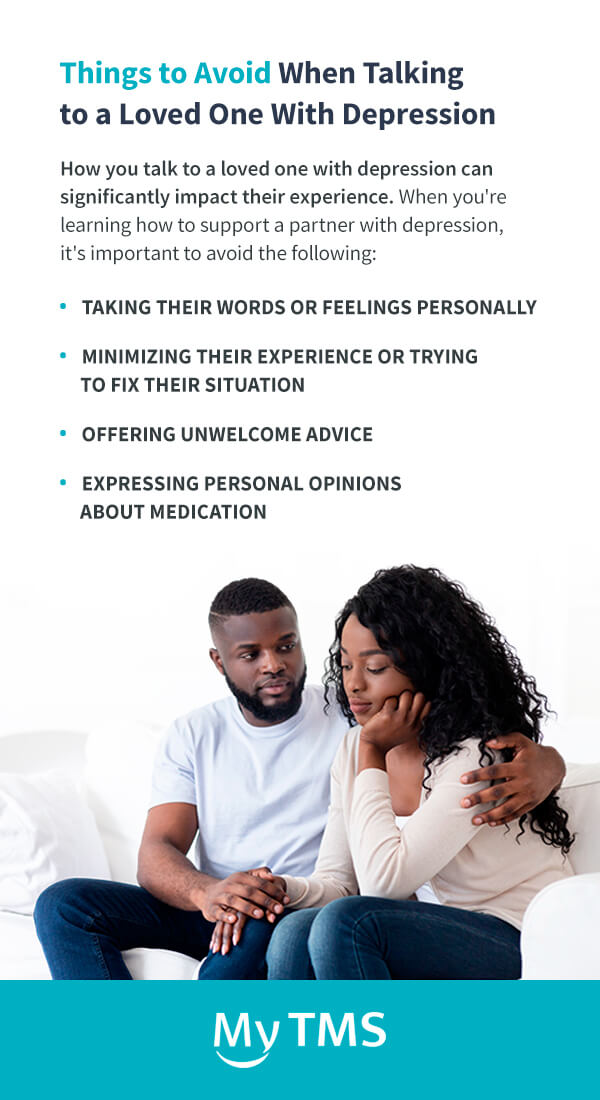
Living with a depressed partner can be difficult if you’re not sure how to support them. If you don’t understand depression and its symptoms, this can affect the relationship between you and your loved one. A little support can help your partner feel loved and hopeful as they navigate their mental health journey, and it can help you grow closer together.
If you take steps to learn about depression and how to help your spouse cope with depression, you can strengthen your relationship. You can help your partner cope with depression by recognizing symptoms and showing support in various ways.
Recognizing Depression Symptoms in a Loved One
Occasional sadness or feeling down now and then is normal. However, frequent sadness and other signs may indicate depression. Your loved one may have depression if they experience some of the following symptoms:
- Persistent feelings of sadness, hopelessness, worthlessness or emptiness
- Irritability
- Pessimism
- Loss of pleasure or decreased interest in previous hobbies
- Fatigue
- Low energy
- Slow movements
- Restlessness
- Trouble sleeping
- Oversleeping
- Memory loss or frequent forgetfulness
- Difficulty concentrating and making decisions
- Weight and appetite changes
- Suicidal thoughts
- Aches and pains including headaches, muscle aches and digestive issues
If your partner has depression, they may experience a few or many of the listed symptoms for at least two weeks. You may notice they seem more sad or pessimistic than usual, and they may express feelings of hopelessness or worthlessness. They may cry more often than usual or appear unusually irritable.
You may also notice your loved one neglecting their hygiene and failing to take care of their appearance. They may frequently skip showering or brushing their teeth. They may also sleep more than usual or struggle to sleep at night and display low energy throughout the day. What may appear as laziness at first can actually be common depression symptoms.
It’s also important to recognize signs of suicidal thoughts or actions. Seek immediate professional assistance if you notice any of the following signs:
- Severe mood swings
- Talking about suicide
- Displaying an obsession with death
- Researching ways to commit suicide
- Gathering means for suicide, such as harmful pills or a gun
- Social withdrawal
- Overwhelming feelings of hopelessness
- Giving belongings away or getting affairs in order
- Significant personality changes
- Significant changes in regular routines
- Self-destructive behavior, including reckless driving or substance misuse
- Saying goodbye
8 Ways to Help a Partner Cope With Depression
Learning how to help a depressed spouse and sustain your marriage is important for both you and your partner’s mental health. You can help your partner cope with depression by offering support, implementing healthy lifestyle changes and practicing self-care. Depression can be difficult for you and your loved one, so it’s important to learn how to provide healthy support while also taking care of your needs. You can help your partner cope with depression in the following ways:
1. Educate Yourself
Educate yourself about depression so you can better understand and support your partner. Learn about depression symptoms so you can extend patience and understanding when your loved one experiences these side effects. Depression symptoms can often interfere with relationships, so understanding them can help you avoid miscommunicating or taking your partner’s actions personally.
It’s important to comprehend that depression symptoms can fluctuate. Your loved one may feel great for a few days and then begin experiencing symptoms again. Loved ones don’t always understand the ebb and flow of symptoms, so learning about them can help you express compassion when your partner experiences mood changes.
Challenge any preconceived thoughts you had about depression so you can avoid judging or stereotyping your partner. Acknowledge that when a person experiences depression, they are not weak or lazy. Depression is a real illness that can cause varying degrees of pain and discomfort.

2. Express Empathy
Depression can make people feel isolated and alone. Help your partner feel supported by asking questions, validating their feelings and reminding them that you care. Ask open questions such as, “You’ve seemed a little down lately. Is there anything you’d like to talk about?” Give your loved one the opportunity to share their feelings if they’re comfortable, but offer patience and understanding if they don’t want to talk.
Practice active listening and validate your partner’s feelings. Use supportive phrases such as “That sounds difficult” or “I’m so sorry you’re going through this.” Use body language to show interest in what they are saying, and avoid giving advice unless they request it. If your loved one doesn’t feel like talking right away, continue reminding them that you care and you’re available when they need support.
3. Be Present
Simply being there for your partner can be excellent support. Sit with them and listen when they feel comfortable talking. Offer to give them a hug or hold their hand when they seem down. Be present with them, and express encouraging statements that let them know they are loved, important and not alone.
Offer to take your loved one out of the house to do something fun or ask them if they would rather stay inside and rest. You don’t have to do anything extravagant or try to make them feel better. Sometimes simply sitting with your partner while they experience their feelings is enough to make them feel supported.
4. Implement Supportive Lifestyle Changes
Make supportive lifestyle changes to bolster your partner’s health. Mental and physical wellness are important in treating depression, so making a few changes at home can significantly improve depression symptoms.
Since people with depression don’t always have the energy or motivation to make healthy choices, you can create a productive home environment to help support their health. Implement the following strategies to create a healthier lifestyle for both of you:
- Create a schedule: Create a schedule for daily tasks to reduce stress in your home. People with depression often feel more in control of their lives when they have a structured routine to follow.
- Exercise: Exercise supports mental health and can ease depression symptoms. Exercise together on a daily walk, run or bike ride.
- Eat healthily: Good nutrition is also important for mental health. Plan and cook healthy meals together to encourage a nutritious diet and help ease depression symptoms.
- Focus on positivity: Point out when you see progress to help your partner focus on the positive. A little encouragement can go a long way.
- Spend meaningful time together: Since people with depression will often neglect activities and hobbies they once enjoyed, planning fun weekly dates can help your partner avoid isolation. Go out to eat, play a board game, watch a movie, visit friends or spend time with family.
5. Show Love
Depression can make people feel like they are unloved or a burden to others. Let your partner know you love them even when they feel down, and show small acts of kindness toward them. Remind them that they have friends and family who love them. Offer reassurance that you and their family are here for support when they need it.

6. Offer to Help With Additional Tasks
Depression can deplete a person’s motivation to complete simple daily tasks. If you take turns completing tasks or divide jobs between the two of you, your partner may feel overwhelmed and neglect their usual responsibilities. Step in and complete some extra tasks when you’re able to, and offer to help them with other tasks. If they normally walk the dog, offer to take the dog for a walk while they rest, or go for a walk with them.
If your partner usually does the dishes, offer to help dry while they wash. If they normally do the laundry, offer to sit with them and help fold clothes. Simply taking some stress off their shoulders or giving them company while they complete things can help.
7. Encourage Them to Seek Help When Needed
Encourage your partner to seek help when they need it. People with depression sometimes struggle to reach out for help because they don’t recognize that they need it or simply don’t know how to ask for help. Talk with your partner when you notice signs of depression and let them know what you’ve learned about it. Discuss treatment options so they know what’s available.
Offer to help your loved one review therapists and make an appointment, and encourage them to attend therapy even when they don’t feel like going. You can also offer to help them make a list of things they’d like to talk about with their therapist and remind them of progress they’ve made in therapy to help motivate them.
Encourage your partner to discuss medication decisions with a healthcare professional, and support their choices. Your loved one may try an antidepressant and decide to stop taking it due to uncomfortable side effects or other reasons. It can be dangerous to stop taking an antidepressant abruptly, so encourage them to talk with their healthcare professional about tapering off the medication or safely switching to a different one.
Suggest additional depression treatments if your partner finds that their therapy sessions or medications are not helping. They can find a new therapist or try treatments such as transcranial magnetic stimulation (TMS).
8. Practice Self-Care and Patience
It’s important to know how to cope when your partner has depression because you have to tend to your own needs as well. Practicing self-care will prevent you from becoming burnt out while caring for your partner. To practice self-care, try some of the following tips:
- Dedicate time to enjoying your hobbies and interests.
- Schedule time with friends and family.
- Eat healthy meals and stay hydrated.
- Practice meditation.
- Give yourself time to rest.
- Seek support when you need it.
Caring for a loved one can cause stress and deplete your energy if you neglect your own self-care. Pay attention to your feelings and rest when you’re overwhelmed. Schedule regular times to visit friends, spend time with family, meditate or do things you enjoy. You will be better able to support your partner when you feel rested and healthy yourself.
Seek help from a support group, counselor or therapist if you feel overwhelmed or stressed. Talking with others can help you identify your own mental health needs and work through them as you cope with supporting your loved one.

Things to Avoid When Talking to a Loved One With Depression
How you talk to a loved one with depression can significantly impact their experience. When you’re learning how to support a partner with depression, it’s important to avoid the following:
Taking Their Words or Feelings Personally
When talking to a loved one with depression, remember that depression is not your or your partner’s fault. If they express difficult thoughts or feelings, avoid taking them personally. Allow your partner to feel what they are feeling, and take time for yourself if you need to.
Minimizing Their Experience or Trying to Fix Their Situation
Avoid comparing your partner’s situation to others’ situations or trying to minimize their feelings by telling them to think positively. You can encourage positive thinking by offering compliments or reminding your loved one of positive memories and things to look forward to, but avoid telling them to simply think positively. It’s also best to avoid using phrases such as, “I know how you feel” or “Everyone goes through this sometimes” because these can minimize your partner’s feelings.
Offering Unwelcome Advice
If your significant other is struggling with depression, they may not have the energy to receive advice or implement it. Rather than giving advice when your partner feels down, listen to them empathetically and offer advice only if they ask for it. You can also encourage positive actions by inviting them to walk with you or eat a healthy meal together.
Expressing Personal Opinions About Medication
Allow your partner to make their own decisions regarding medication. Some people find medication helpful, while others prefer natural remedies or other treatments. Choosing to take or not take medication is a personal decision that your loved one should decide with their healthcare professional.
Avoid pressuring your partner to take antidepressants if they don’t feel comfortable doing so, and avoid discouraging medication if your loved one finds it beneficial. If you have strong opinions about medication, try to avoid talking about the subject.
Contact My TMS Therapy
Depression in relationships can be difficult for people and their partners. Depression is a very real condition that can cause emotional and physical pain, making it difficult to enjoy life, perform daily tasks and connect with others. You can help your loved one cope with depression in various ways. Remind them that they are loved and supported, and help them seek professional help when needed.
Consider TMS therapy if your partner finds that other depression treatments aren’t helping them. TMS is a safe, non-invasive procedure that can treat depression symptoms when therapy and medication are ineffective. This FDA-approved treatment uses magnetic energy pulses to stimulate nerve cells in the brain’s prefrontal cortex and ease depression symptoms. My TMS Therapy offers both deep TMS and repetitive TMS, and our staff is passionate about providing high-quality care. Contact My TMS Therapy to learn more about how we can help treat depression.


